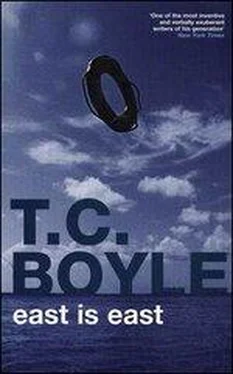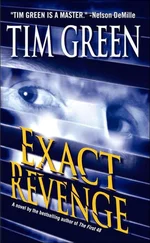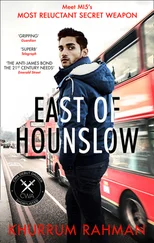Tom Boyle - East is East
Здесь есть возможность читать онлайн «Tom Boyle - East is East» весь текст электронной книги совершенно бесплатно (целиком полную версию без сокращений). В некоторых случаях можно слушать аудио, скачать через торрент в формате fb2 и присутствует краткое содержание. Жанр: Современная проза, на английском языке. Описание произведения, (предисловие) а так же отзывы посетителей доступны на портале библиотеки ЛибКат.
- Название:East is East
- Автор:
- Жанр:
- Год:неизвестен
- ISBN:нет данных
- Рейтинг книги:5 / 5. Голосов: 1
-
Избранное:Добавить в избранное
- Отзывы:
-
Ваша оценка:
- 100
- 1
- 2
- 3
- 4
- 5
East is East: краткое содержание, описание и аннотация
Предлагаем к чтению аннотацию, описание, краткое содержание или предисловие (зависит от того, что написал сам автор книги «East is East»). Если вы не нашли необходимую информацию о книге — напишите в комментариях, мы постараемся отыскать её.
, praised by
in
as "one of the most exciting young fiction writers in America," the result is a sexy, hilarious tragicomedy of thwarted expectations and mistaken identity, love, jealousy, and betrayal.
East is East — читать онлайн бесплатно полную книгу (весь текст) целиком
Ниже представлен текст книги, разбитый по страницам. Система сохранения места последней прочитанной страницы, позволяет с удобством читать онлайн бесплатно книгу «East is East», без необходимости каждый раз заново искать на чём Вы остановились. Поставьте закладку, и сможете в любой момент перейти на страницу, на которой закончили чтение.
Интервал:
Закладка:
He’d been in the brig a week, and in that time he’d lost twenty pounds or more. The turtleneck swam on him, his wrists were like the knucklebones of a pig, his eyes had sunk into his head and his jowls had evaporated. Two balls of rice a day. It was inhuman, medieval, barbaric. And it had been, what—two days?—since he’d got even that. Lying there in the stinking grass beneath the alien sun of a wild and alien country, wet and exhausted and starving, he felt his consciousness pull apart like a piece of taffy, till he was thinking with his brain and his stomach both. While his brain took note of the vacancy of the sky and squared off the boundaries of his distress, his stomach spoke to him in the terms of sharpest denunciation. Cavernous and hollow, rumbling, gurgling and raging, it accused him with each futile contraction. He was a fool, an idiot, a shit-for-brains. Why, even at that moment he could be tucking in his napkin on the Japan Air flight to Narita, asking the flight attendant for a bit more rice, another morsel of Norwegian salmon, just a drop more sake, courtesy of the Japanese embassy. Of course, they’d be waiting for him at the airport with a set of handcuffs, half a dozen charges ranging from assault and battery to dereliction of duty, and a humiliation that knew no bounds—but could it be worse than this? His stomach spoke to him: What joy in dignity, in life even, without food?
Like most Japanese, Hiro regarded his stomach—his hara —as the center of his being, the source of all his physical and spiritual strength. If a westerner were to talk of people who are kindhearted or coldhearted, of heartbreak or heartease, a Japanese would modify the conceit to feature the stomach—in his eyes, a far more vital organ. A heart-to-heart talk would be conducted stomach to stomach, hara o awaseru, while a blackhearted cad would be blackstomached, a hara ga Kuroi hito. Two inches beneath the navel lies the kikai tanden, the spiritual center of one’s body. To release the ki or spirit in the act of hara-kiri is to release it from the belly, the guts, the only organ that counts.
For Hiro, though, the hara took on an even more exaggerated importance, for he lived to eat. Harassed at school, tormented on the playground, he took solace in the pastry shop, the noodle emporium and ice cream stand, feeding his strength and determination even as he quieted the cravings of his gut. In time, eating became his sole sensual expression. Oh, he’d had the odd carnal encounter with bar hostesses and prostitutes, but he’d never enjoyed it much, never been in love—he was only twenty, after all—and life offered only work, sleep and food. And food was what he needed now. Desperately. But what could he do? He’d been in the water for eight hours, thrashing at the waves like a marathon swimmer, and now he was too exhausted even to hold his head up. He thought vaguely of chewing a bit of marsh grass to assuage the storm in his gut, and then he closed his eyes on the image of old Kuroda’s shirt and the lingering loss of his last two balls of rice.
When he awoke again the sun was dipping into the treetops behind him. At first he was disoriented, the erasure of sleep giving way to color, movement and the reek of mud, but the water brought him back: he was in America, in the U.S. of A., starving to death, and the tide was coming in. He felt it warm against his chin, his shoulders, the swell of his abdomen. With an effort, he pushed himself up on his elbows. He was feeling dizzy. The girdle of black tape cut at his flesh and he felt a sharp throb in the shin of his left leg—had he banged it against the underside of the boat when those butter-stinkers attacked him in the dark?
He didn’t know. He didn’t care. All he knew was that he had to get up. Had to move. Had to find a human habitation, slip through the window like a ghost and locate one of the towering ubiquitous refrigerators in which Americans keep the things they like to eat. He was conjuring up the image of that generic refrigerator stuffed with the dill pickles, Cracker Jack and sweating sacks of meat the Americans seemed to thrive on, when he became aware of a subtle but persistent pressure on the inside of his right thigh. He froze. There, perched on his torn pantleg and studying the sunburned flesh of his inner thigh with a gourmand’s interest, was a small glistening purple-backed crab. It was, he saw, about the size of a mashed ball of rice.
He was going to eat that crab, he knew it.
For a long moment he watched it, afraid to move, his hand tensed at his side. The crab hunched there, unaware, water burbling through its lips— were those its lips?—and combing the stalks of its eyes with a single outsize claw. Hiro thought of the crab rolls his grandmother used to make, white flaking meat and rice and cucumber, and before he knew it he had the thing, a frenzy of snapping claws and kicking legs, and it was in his mouth. The shell was hard and unpleasant—it was like chewing plastic or the brittle opaque skin of fluorescent tubes—but there was moisture inside and there was the thin salty pulp of the flesh, and it invigorated him. He sucked the bits of shell, ground them between his teeth and swallowed them. Then he looked for another crab.
There was none in sight. But a grasshopper, green of back and with a fat yellow abdomen, made the mistake of alighting on his shirt. In a single motion he snatched it to his mouth and swallowed it, and even as he swallowed it, his hara screamed for more. Suddenly he was moving, stumbling through the stiff high grass, oblivious to the slashing blades that cut at his feet and shins, his hands and arms and face. He moved as if in a trance, the olfactory genius that had visited him at sea come back again with a vengeance. Dictatorial and keen, it led him by the nose, led him across a snaking inlet and into the shadow of the moss-hung trees at the edge of the marsh. He smelled water there—old water, stale and dirty water, the standing water of swamps and drains and ditches—but water all the same … and way beyond it, at the periphery of his senses, he caught a single faint electrifying whiff of fat sizzling in the pan.
It was the golden hour of the day, the sun gone soft as A big dab of butter, and Olmstead White, the grandson of the son of a slave who was the son of a slave who was a free man of the Ibo tribe in West Africa, was fixing supper. He was sixty-eight years old, his limbs as dry and sinewy as jerky, his face baked hard by the morning sun flashing off the sea. He’d been born, raised and schooled on Tupelo Island, and in all his life he hadn’t been to the mainland more than two dozen times. His garden stood tall with corn and staked tomato plants, he raised hogs, fished and crabbed and shrimped and oystered, and he did odd jobs for the white people at Tupelo Shores Estates when he needed a bit of pocket money for a chew or a drink or a new battery for the vanilla-colored transistor radio that brought him the Braves games in the cool of the evening. His brother, Wheeler, with whom he’d lived through all the mornings, afternoons and evenings of all his bachelor days, lay six months buried in the family plot out back of the garden.
On this evening, while the Braves game whispered huskily through the tinny speaker, Olmstead White sliced a cucumber and tomato, fixed a side dish of poke greens and was deep-frying a dozen sweet fresh oysters, shucked and floured and dipped in corn-meal and cayenne pepper. He wasn’t thinking of Wheeler particularly, or of his nephew Royal, Eulonia’s boy, with whom he sometimes watched the hilarious antics of MTV late into the night—oh, the haircuts, he loved the haircuts—nor was he paying much attention to the announcer’s dead and buried voice as the Braves blew yet another one. He was thinking nothing, really, his mind in a state of suspended animation as the grease crackled, the birds called in the trees and the screens glowed with the sun. As usual, and without thinking, he prepared a small plate for Wheeler. Later, in the twilight, when Gant and Murphy and Thomas and the rest of the bush leaguers had rolled over and played dead against the indestructible New York Mets, he would set the dish on his brother’s grave and retrieve the empty one from the night before.
Читать дальшеИнтервал:
Закладка:
Похожие книги на «East is East»
Представляем Вашему вниманию похожие книги на «East is East» списком для выбора. Мы отобрали схожую по названию и смыслу литературу в надежде предоставить читателям больше вариантов отыскать новые, интересные, ещё непрочитанные произведения.
Обсуждение, отзывы о книге «East is East» и просто собственные мнения читателей. Оставьте ваши комментарии, напишите, что Вы думаете о произведении, его смысле или главных героях. Укажите что конкретно понравилось, а что нет, и почему Вы так считаете.











